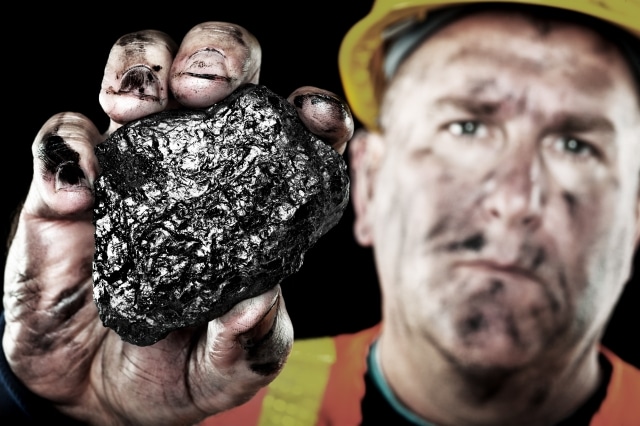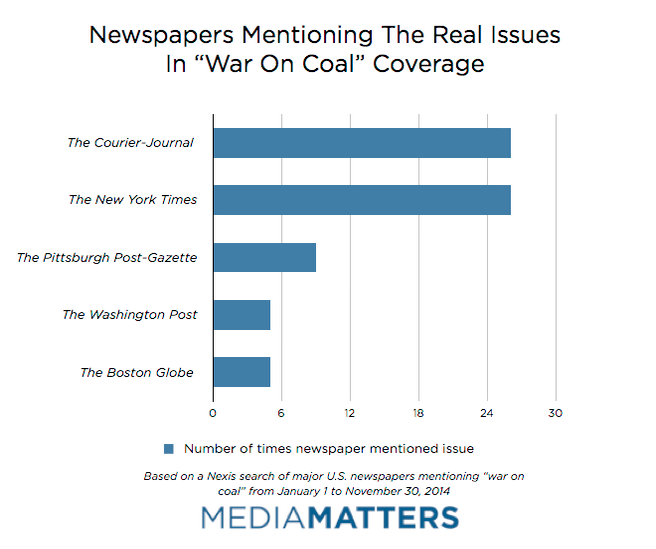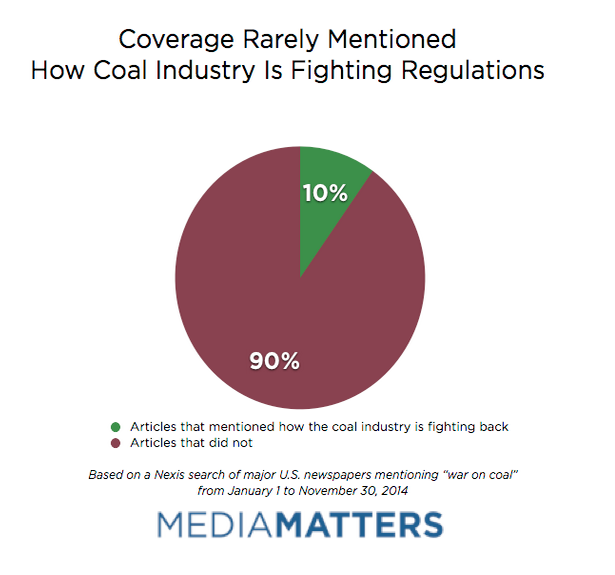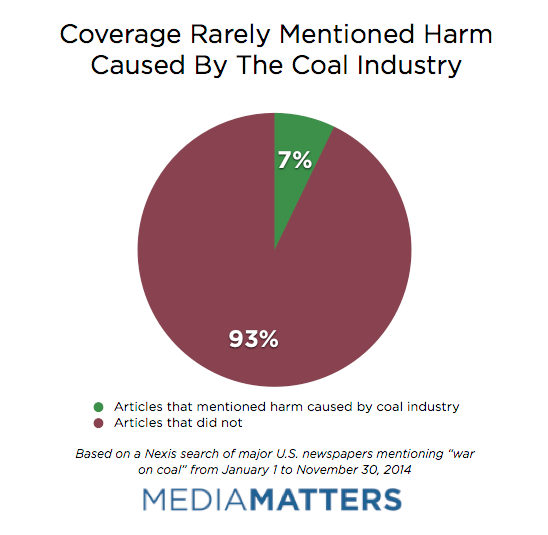U.S. newspapers are helping conservatives push their misleading “war on coal” narrative, according to a new report.
There are a number of reasons why the U.S. newspapers are helping conservatives push their misleading “war on coal” narrative, according to a new report.
There are a number of reasons why the tide has turned against the coal industry around the globe. Mining and burning coal for energy poses huge risks for human health and the environment, for instance, mainly due to the vast amounts of air and water pollution created throughout coal’s lifecycle.
Then of course there’s the fact that coal is the single largest source of global warming pollution—while coal-fired power represents only 39% of all electricity generated in the U.S, according to the EPA, it is responsible for 75% of carbon emissions.
And of course the health of coal miners and the safety of mining operations is a cause for concern, as well. The indictment of coal baron Don Blankenship is proof enough of that—a U.S. attorney recently pressed conspiracy charges against Blankenship for violating federal mine safety and health standards and impeding federal mine safety officials, among other offenses committed before and after the explosion at Massey Energy’s Upper Big Branch Mine in 2010 that took the lives of 29 workers.
If you need more proof, there was a study conducted this year that found the worst form of black lung is affecting miners in Kentucky, Virginia, and West Virginia at levels not seen in four decades.
But it’s not just the dangers of the job that are driving coal miners out of work: greater automation in coal mining operations and the rise of cheap, abundant natural gas thanks to fracking have also taken a heavy toll on the coal industry.
Yet a Media Matters analysis of the 233 articles published in major U.S. newspapers this year that mentioned the phrase “war on coal” found that more than half ignored all of these underlying causes of the coal industry’s decline.
Just 68 of the 233 articles mentioned climate change–and that was the issue most frequently cited. The other issues, which have had the biggest impact on coal-producing states in recent decades, recieved “especially sparse” coverage, Media Matter found: “Health and pollution, economic and technological factors, and miner safety received mentions in 43, 33, and eight articles, respectively.”
Even the articles that did mention climate change were often misleading, Media Matters found, as they often did so in the context of the Environmental Protection Agency’s Clean Power Plan, which aims to lower global warming pollution from power plants by setting out different emissions reduction levels for each state to reach by 2030, which in many cases will mean retiring aging coal-fired plants. The only problem is, those rules have yet to take effect.
Take out the articles that mention climate change alongside the supposed “war on coal,” and you’re left with only 18% of the 233 that mention the other issues that are actually impacting the industry right now.
The Courier-Journal and The New York Times were the two papers that mentioned the real issues impacting the coal industry most frequently, as you can see from this chart:
[CHART]
Some 127 articles did manage to work in a reference to President Obama being responsible for the “war on coal,” however.
Meanwhile, less than 10% of the 233 articles made any mention of the numerous threats to human health and the environment posed by coal or the many ways in which coal companies attempt to block any new regulations from impeding their ability to conduct business-as-usual.
[CHARTS]
Image Credit:
” target=”_blank”>tide has turned against the coal industry around the globe. Mining and burning coal for energy poses huge risks for human health and the environment, for instance, mainly due to the vast amounts of air and water pollution created throughout coal’s lifecycle.
Then of course there’s the fact that coal is the single largest source of global warming pollution—while coal-fired power represents only 39% of all electricity generated in the U.S, according to the Environmental Protection Agency (EPA), it is responsible for 75% of carbon emissions.
And of course the health of coal miners and the safety of mining operations is a cause for concern, as well. The indictment of coal baron Don Blankenship is proof enough of that—a U.S. attorney recently pressed conspiracy charges against Blankenship for violating federal mine safety and health standards and impeding federal mine safety officials, among other offenses committed before and after the explosion at Massey Energy’s Upper Big Branch Mine in 2010 that took the lives of 29 workers.
If you need more proof, there was a study conducted this year that found a severe form of black lung is affecting miners in Kentucky, Virginia, and West Virginia at levels not seen in four decades.
But it’s not just the dangers of the job that are driving coal miners out of work: greater automation in coal mining operations and the rise of cheap, abundant natural gas thanks to fracking have also taken a heavy toll on the coal industry.
Yet a Media Matters analysis of the 233 articles published in major U.S. newspapers this year that mentioned the phrase “war on coal” found that more than half ignored all of these underlying causes of the coal industry’s decline.
Just 68 of the 233 articles mentioned climate change—and that was the issue most frequently cited. The other issues, which have had the biggest impact on coal-producing states in recent decades, recieved “especially sparse” coverage, Media Matter found: “Health and pollution, economic and technological factors, and miner safety received mentions in 43, 33, and eight articles, respectively.”
Even the articles that did mention climate change were often misleading, Media Matters found, as they often did so in the context of the EPA’s Clean Power Plan, which aims to lower global warming pollution from power plants by setting out different emissions reduction levels for each state to reach by 2030, which in many cases will mean retiring aging coal-fired plants. The only problem is, those rules have yet to take effect.
Take out the articles that mention climate change alongside the supposed “war on coal,” and you’re left with only 18% of the 233 that mention the other issues that are actually impacting the industry right now.
The Courier-Journal and The New York Times were the two papers that mentioned the real issues impacting the coal industry most frequently, as you can see from this chart:
Some 127 articles did manage to work in a reference to President Obama being responsible for the “war on coal,” however.
Meanwhile, less than 10% of the 233 articles made any mention of the numerous threats to human health and the environment posed by coal or the many ways in which coal companies attempt to block any new regulations from impeding their ability to conduct business-as-usual.
Image Credit: Joe Belanger / Shutterstock.com
Subscribe to our newsletter
Stay up to date with DeSmog news and alerts










